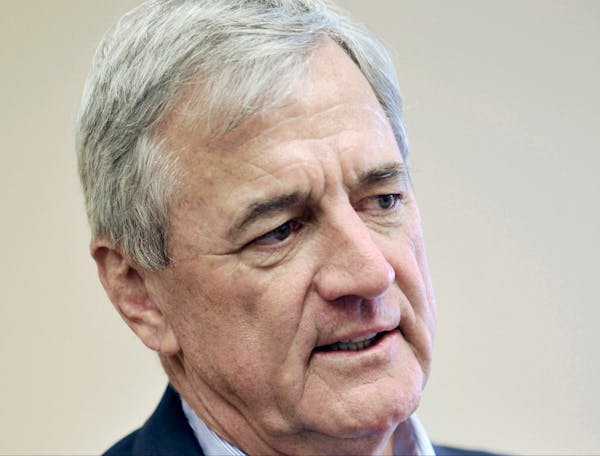The Legislature moved closer Friday to suing Gov. Mark Dayton, as Republicans fought back against the DFL governor's decision to zero out their operating budget.
"We feel like we had no choice," Senate Majority Leader Paul Gazelka, R-Nisswa, said Friday after a legislative panel voted to enter into negotiations with a Twin Cities law firm. He said if the operating funds that Dayton vetoed earlier this week can't be restored, that the state Senate would run out of money around Aug. 1.
Barring some last-minute resolutions, a lawsuit seems likely. Republicans say Dayton's line-item veto of legislative funding is an unconstitutional encroachment on another branch of government. Dayton is trying to force Republican legislative leaders to reopen several disputes from the recently concluded legislative session: the total amount of tax cuts, a few education policy changes and a fight over driver's licenses for illegal immigrants.
Dayton's move also followed a decision by Republicans to approve a measure that would have terminated funds for Dayton's Department of Revenue had the governor not signed off on their tax cuts.
In all, the 201-member Legislature employs more than 500 people. Dayton used his line-item veto authority, which lets him strike out individual spending items in larger budget bills, to cut all funding for House and Senate operations beginning July 1. Legislative leaders say reserve funds would bridge the immediate funding gap but would be quickly exhausted.
DFL lawmakers on the Legislative Coordinating Commission voted against entering into talks with a law firm.
"Minnesotans will be disappointed to see their hard-earned tax dollars spent on litigation and no attempt to reach an agreement short of litigation," said House Minority Leader Melissa Hortman, DFL-Brooklyn Park.
The legislative commission vote lets lawmakers enter into negotiations with the law firm of Kelley, Wolter & Scott, which has offered to cut its $650 per hour fee in half.
Gazelka said he had fruitless talks with Dayton this week on how to resolve the standoff, hoping to find what he called an "off-ramp" from the current path toward a confrontation in the courts. Legal scholars say the executive-legislative dispute qualifies as a constitutional crisis for the state.
"We are a separate coequal branch of government and we think the governor trying to silence another branch of government is a clear violation of the Constitution," said House Speaker Kurt Daudt, R-Crown.
But Hortman argued that Dayton was simply defunding, not dissolving the Legislature. She said lawmakers could do their job without pay. Dayton is arguing that the Minnesota Constitution places no conditions on his line-item veto authority.
The separation-of-powers fight sprung from the end of an otherwise productive legislative session. Dayton earlier this week signed into law 10 budget bills making up the state's $46 billion, two-year budget, along with $650 million in tax cuts and nearly $1 billion in public works construction.
But those bills included a handful of provisions that Dayton — and a constellation of progressive groups — find objectionable. Specifically, he wants Republicans to return to the negotiating table to scale back tax cuts, especially on wealthy estates, business property and smokers; repeal a new law blocking driver's licenses for undocumented immigrants, and change another new law that makes changes to Minnesota's system of teacher licensure.
Republicans point out that Dayton initially signed off on those GOP priorities in exchange for some of his own priorities; Dayton's administration has not denied that.
The dispute over the question of driver's licenses for immigrants not in the country legally bled into DFL election politics this week. The group Navigate MN, which bills itself as Minnesota's "largest network of undocumented youth and allies," announced plans to boycott and protest an annual DFL fundraising dinner scheduled for Saturday; in response, several DFL candidates for governor said they'd join the boycott.
However, the group retreated from its boycott Friday after Dayton agreed to meet with immigrant community members directly.
The provision at issue took an administrative rule already on the books that bars licenses for illegal immigrants, and hardens it into law. That means undoing it in the future would take a vote of the Legislature rather than executive action by the governor.
"I understand the anger, and share the very legitimate concerns, of Minnesota's immigrant communities, and will continue to fight with them to remove this hateful provision from state law," Dayton said in a statement Friday.
J. Patrick Coolican • 651-925-5042

